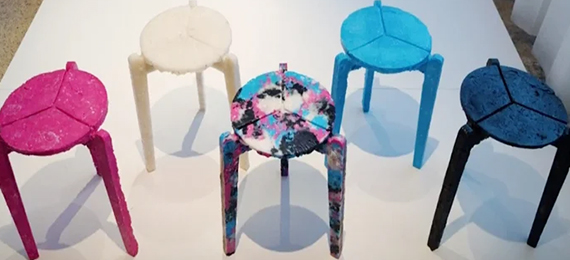
Kim Ha-neul, a furniture design student in South Korea recycles disposable face masks into stools! He calls his stools ‘Stack and Stack’.
Kim was bothered by the waste that was caused by disposable face masks as they were mostly made of non-woven fabrics such as polypropylene. Therefore, he decided to recycle the face masks into stools. He says that about 1500 masks are needed to make one stool.
How Did He Get the Idea?
His idea is that face masks are mostly made of plastic, hence he decided to recycle those face masks. He says, “Plastic is recyclable, so why don’t we recycle face masks, which are made of plastic?”
When Did He Start Making Face Masks into Stools?
At the Kaywon University of Art and Design in Uiwang city, south of Seoul, Kim set up a mask collection box and started collecting masks in June. He collected over 10,000 used masks and he has also received a tonne of defective masks from a factory.
How Does Kim Make Stools from Masks?
Once he collected the masks, in order to reduce the risk of coronavirus transmission, he kept the masks in storage for a minimum of four days. After receiving the masks, Kim removes the elastic bands and wires and he wields a heat gun over the masks in a mould in order to melt them at a temperature over 300 degrees Celsius. Three-legged stools that are about 18 inches are thus formed. He displayed his stools made from pink, black, white, and blue masks.
Not just stools, he also hopes to create other furniture pieces such as tables and chairs.
He is also insisting the government and private companies set up a separate box for collecting the disposable face masks in order to recycle them.
The government data shows that South Korea produced more than one million face masks in September alone.
These stools are not yet ready for sale, but the fellow students and teachers were impressed by his unique and eco-friendly solution!
Park Sung-chan, an art student, says that this idea conveys such a strong message. This might probably remind us of what we have been through in 2020 with the COVID-19. And the important part is they are all environmentally friendly.
As we continue to use masks, in the future it might have an adverse effect on our environment. The masks we use are mostly made of fabrics such as polycarbonate, polyethylene, and polyester. These are all plastic-based, hence once they are used and discarded there are higher chances for them to land up in landfill or oceans. Therefore, this interesting concept by Kim Ha-neul was really appreciable!